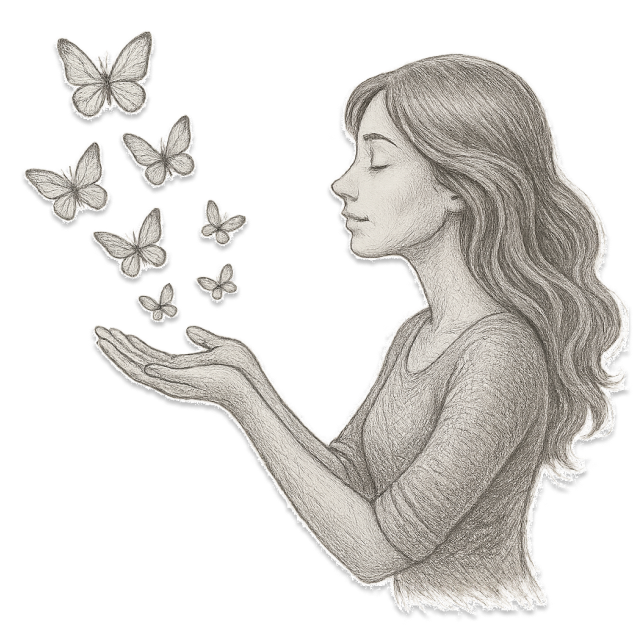
Life has a way of upending our sense of self. Whether it’s the end of a marriage, the death of someone close to you, or the quiet that follows when your children leave home, these moments can leave us questioning who we are. It’s normal to feel like you’ve lost touch with the person you used to be, but the path to rediscovering yourself is open. Here are ways to reconnect with your true self during life’s transitions.

Acknowledge the Change, But Don’t Let It Define You
The first step in finding yourself again is to recognize the emotional impact of your situation. Whether it’s the dissolution of a relationship, the grief of loss, or the shift in your family dynamic, it’s natural to experience sadness and uncertainty. Permit yourself to feel those emotions fully.
However, your identity isn’t solely wrapped up in your past roles or relationships. At your core, you remain the person you’ve always been, shaped by your unique experiences, passions, and aspirations. Allow yourself to mourn what’s gone, and make space for healing and renewal. This chapter of your life is significant, but it’s just one part of a much larger story.

Reconnect with the Things That Bring You Joy
When your life is focused on others, it’s easy to forget what excites you. Hobbies, interests, and activities that once filled you with energy might have taken a backseat. Now is the time to reclaim them.
Reflect on what used to make you feel alive. What were the things that brought you joy before your life became focused on caring for others? It could be anything—from creative pursuits like painting or writing to physical activities like hiking or dancing. If you’re unsure, experiment with new activities or revisit old interests. Rediscovering what lights you up can be a powerful step toward reconnecting with your inner self.

Build a New Rhythm That Works for You
Big life changes often shake up the routines that once brought structure to your days.
This presents an opportunity to create a fresh routine that aligns with your current emotional and physical needs.
Start small—perhaps by committing to daily walks, preparing nutritious meals, or taking time to meditate.
Establishing a routine will help you regain a sense of control and purpose, while also reinforcing your worth.
But be patient with yourself; there’s no rush to have everything figured out immediately. Gradually, a new rhythm will emerge, one that nurtures your well-being during this transition.

Tune in to Your Inner Voice
During major life shifts, it’s easy to get disconnected from your own needs and desires. The demands of others can drown out your inner guidance, leaving you uncertain about what you want or who you are.
To reconnect with yourself, create space for quiet reflection. This could involve journaling, meditative walks, or simply sitting in silence. Ask yourself questions like:
- What principles are most important to me?
- What am I passionate about?
- What do I want the next chapter of my life to look like?
Listening to your inner voice can help you reconnect with what matters most, allowing you to make decisions that align with your authentic self.

Prioritize Your Well-Being
In times of change, it’s easy to forget to take care of your own needs. True self-care goes beyond pampering; it’s about nurturing your physical, emotional, and mental health regularly.
Make self-care a non-negotiable part of your life. Whether it’s enjoying a good book, taking time to relax, or seeking professional support, these practices send a powerful message to yourself: you deserve love, care, and attention. Consider therapy or support groups if you feel the need for deeper guidance as you navigate this journey.
Be Gentle with Yourself and Trust the Process
Rediscovering your identity is not something that happens overnight. It takes time, and there will be ups and downs along the way. Some days, you’ll feel like you’re making progress, while other days may feel overwhelming. Both experiences are part of the journey.
On the harder days, speak to yourself with compassion. Offer yourself the same kindness and encouragement you would give to a close friend in the same situation. Remember, healing isn’t linear, and it’s okay to take things one step at a time.
However, your identity isn’t solely wrapped up in your past roles or relationships. At your core, you remain the person you’ve always been, shaped by your unique experiences, passions, and aspirations. Allow yourself to mourn what’s gone, and make space for healing and renewal. This chapter of your life is significant, but it’s just one part of a much larger story.
Welcome the Possibilities of This New Phase
As you reconnect with your authentic self, embrace the reality that you are now stepping into a new phase of life. While the changes you’ve experienced may feel unsettling, they also present a chance to reinvent yourself.
The end of one chapter makes room for a new beginning, and this transition, though challenging, carries vast potential. What will this next chapter look like? What new paths will you explore, and what adventures will you embark upon? As you move forward, know that you are the creator of your own story.

Final Thoughts
Rediscovering who you are after a significant life change is an incredibly personal journey, one full of potential for growth and self-discovery. By honoring your emotions, reengaging with old passions, and building new routines and connections, you can emerge stronger and more aligned with your true self.
The most important truth to remember is that you are worthy, capable, and fully equipped to create a life that reflects who you are at your core.



